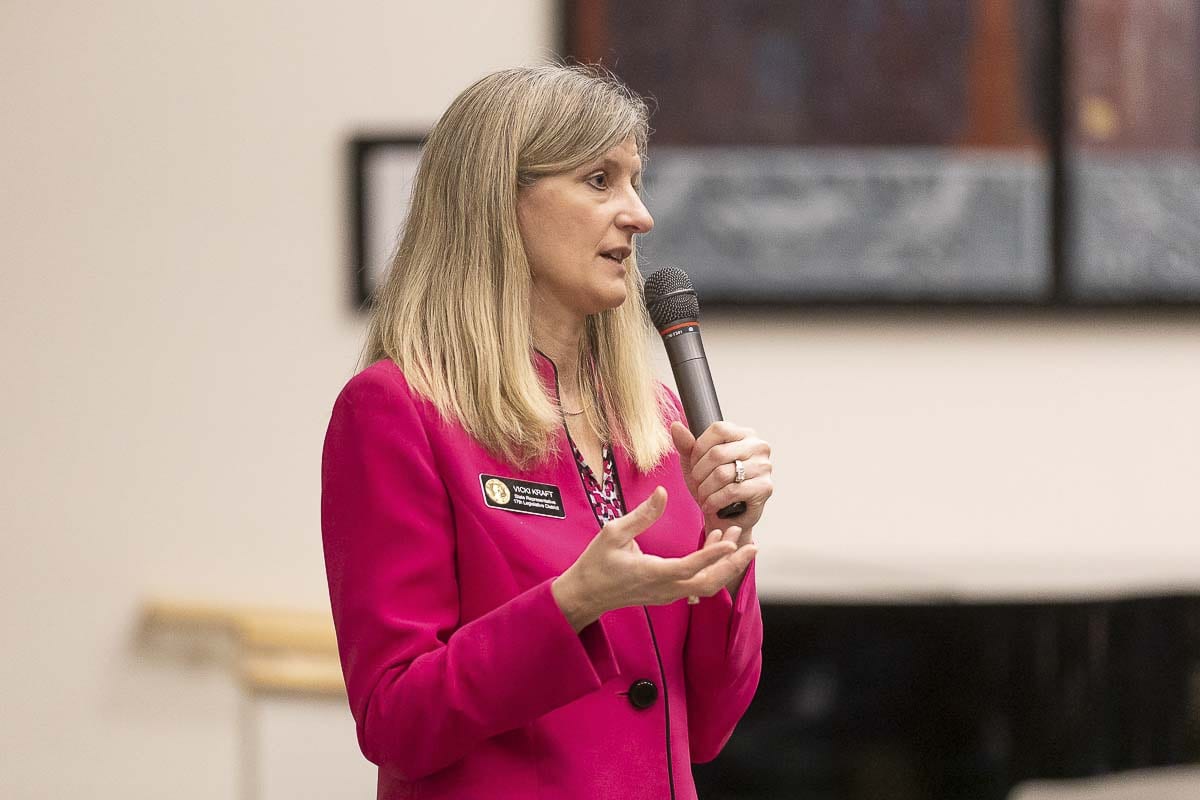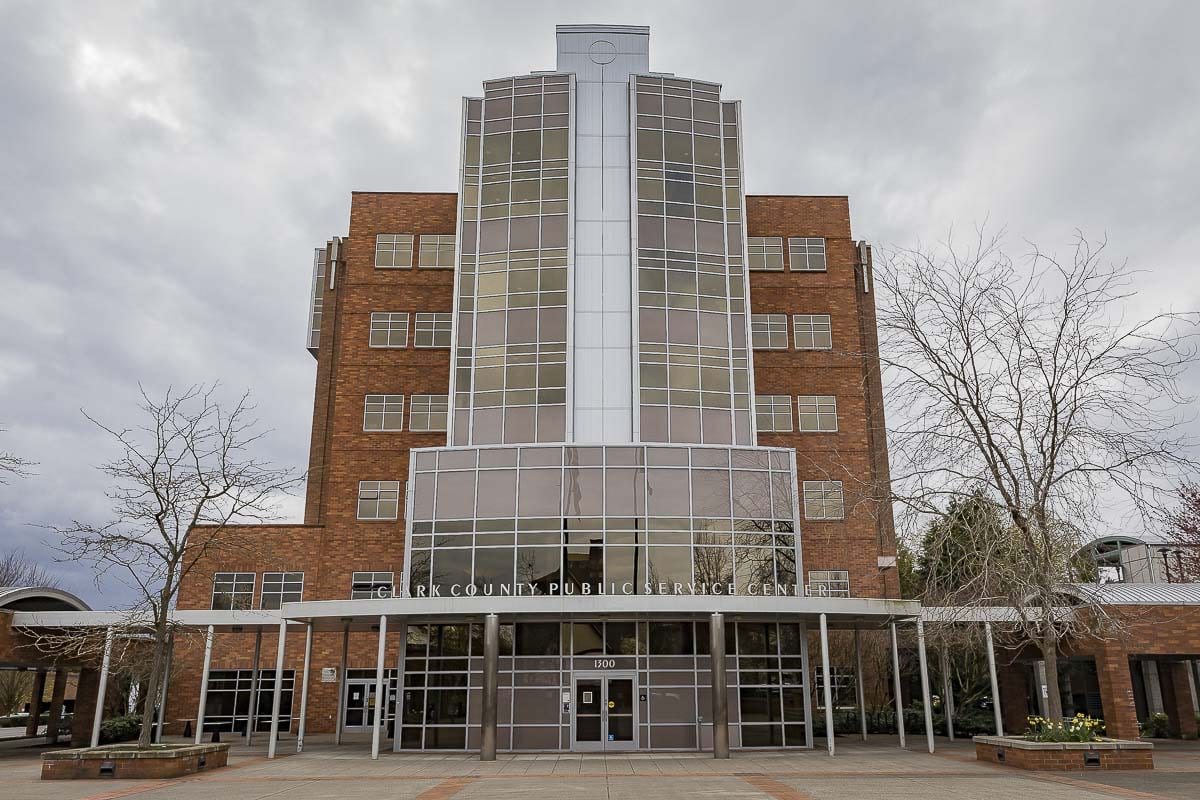Some local governments and law enforcement officers are openly questioning the governor’s authority to force businesses to stay closed
CLARK COUNTY — Amid growing hints that Washington Gov. Jay Inslee may extend at least parts of his stay home order past the May 4 date, pressure continues to grow from many workers and businesses to start lifting restrictions caused by the COVID-19 pandemic.

That outcry was heard loudest over the weekend in Olympia, where more than 2,000 people showed up to demand an end to the shutdowns and a return to normalcy.
Among them was Rep. Vicki Kraft, a Republican from the 17th Legislative District, which represents much of east Vancouver, Brush Prairie, as well as parts of Hazel Dell and Salmon Creek.
“This was really my attempt to get the governor to listen to the business community on both sides of the aisle,” Kraft told Clark County Today, “and to make sure he understood that this issue of reopening business is not a Republican-only issue.”
Kraft said she has heard increasingly from business owners concerned at what they see as a lack of urgency on the governor’s part to address the growing economic crisis caused by the shutdown.
“I even had some Seattle business owners try to connect with their Democrat representatives, both at the federal and state levels,” Kraft says. “They didn’t get any responses but one, and it wasn’t really a response that addressed the question.”
On Tuesday, Inslee reiterated his statement during a press conference on a framework for reopening businesses that decisions would be “guided by science, not politics,” then doubled down on Wednesday.
“This has been working. This is saving lives,” the governor said. “There are people alive today because of the work we’ve done jointly in the state of Washington.”
Inslee spoke Wednesday, in part, to address actions his office has taken in recent days responding to local governments who have attempted to circumvent his stay-at-home order.
In Franklin County, its three county commissioners voted Tuesday to defy the governor’s order, telling businesses there they can reopen.
“As far as I’m concerned the county is open, and I’d encourage people within the law and within the parameters of their own safety — we’re adults, we can make decisions — to behave accordingly. That’s what I’m doing,” said Commissioner Brad Peck, as reported by the Tri-City Herald.
The move comes even as Jackson and Benton County have had one of the highest death rates, per capita, in the state. Four deaths in Jackson County have been blamed on COVID-19, with 35 in nearby Benton County.
“I sent a letter to the Franklin County Commission about some of the actions they took Tuesday,” said the governor at his Wednesday press conference. “I made clear that those actions, really intentionally and knowingly, violated the state law. And so they’ll have to change.”
The governor’s legal counsel also warned businesses in the county that they could face citations and fines if they open in violation of the stay-at-home order, and could not use the commissioner’s resolution to defend their position.
It’s not just county commissioners pushing back against the governor’s order.
Franklin County Sheriff J.D. Raymond has said he would not take enforcement action against any business or church that operates in violation of the governor’s order.
In Snohomish County, which has seen 97 deaths from the virus, Sheriff Adam Fortney posted an 1,100-word letter on Facebook, challenging the governor’s order as unconstitutional.
“As your elected Sheriff I will always put your constitutional rights above politics or popular opinion. We have the right to peaceably assemble. We have the right to keep and bear arms,” wrote Fortney. “We have the right to attend church service of any denomination. The impacts of COVID 19 no longer warrant the suspension of our constitutional rights.”
On Wednesday, Inslee pushed back, quoting Snohomish County Prosecuting Attorney Adam Cornell, who had responded to Forney’s post.
“We are elected to serve under the laws, not to act above them,” Cornell wrote. “An earnest desire to change the law is much different than refusing to enforce it.”
“And I agree with that,” Inslee added.
“I do think encouraging illegal activity jeopardizes the health of people in our communities,” the governor continued. “It also puts in potential legal jeopardy businesses and individuals who are required to follow the state’s lawful order under COVID-19.”

As of the end of March, the governor’s office reported they had received almost 21,000 complaints of businesses and individuals violating the stay-at-home order. That has only increased in recent weeks.
The protests on Sunday were the most visible sign yet that time is running out for Inslee to clearly enumerate the steps needed to begin allowing businesses to resume, and a timeline.
“Business owners are saying they will be responsible and they will do it safely, but they need to be able to reopen,” Kraft says. “And the governor has dragged his feet, not put a plan together, and really seems to have very little interest in addressing a very key need as part of this whole Coronavirus situation.”

Clark County councilors express frustration
During a Board of Public Health meeting on Wednesday morning, Clark County Public Health Officer Dr. Alan Melnick faced tough questions about the modeling used to predict the impact of COVID-19, and whether individual counties and cities should be given leeway in deciding what is best for them.
“The natives are restless,” said County Chair Eileen Quiring. “There are a lot of people that are really ready to be done.”
District 4 Councilor Gary Medvigy spent the most time grilling Melnick about the numbers, wondering why earlier models that had failed so greatly should be trusted now when it comes to continuing to keep businesses closed.
“I’m not trying to minimize the dire consequences of this disease, it’s awful. And it’s impacted the world, I have no question about that,” Medvigy said. “I think we’re not doing a good enough job of showing the positive sides of where we’re at today.”
While admitting that there are signs the rate of infection is slowing, and good news in terms of protective equipment for healthcare workers and testing supplies, Melnick said it is too soon to simply lift restrictions and go back to life as usual.
“My concern is, this is a contagious illness, I mean each person can infect two-to-four other people,” said Melnick. “And if we don’t have other things in place to control this, it can take a few weeks, but we will get right back to that exponential curve.”
Quiring pressed further, saying she believes the governor is basing the bulk of his decision making on what is happening in the hard-hit Puget Sound area.
“Clark County is not in the same dire straits as those Puget Sound counties,” said Quiring, “and I actually would like to really entertain how could we possibly move into a faster phase than, for instance, what the governor’s administration might want to do.”
Emily Sheldrick, the county’s chief civil deputy, chimed in that the county has no authority to override the governor’s stay-at-home order at this point.
“The governor does have the authority to put forth proclamations that have the force of state law,” said Sheldrick. “And, as such, a county or other municipality cannot have local ordinances that conflict with the governor’s proclamation.”

While Clark County doesn’t appear ready to challenge the governor’s authority on legal grounds, gubernatorial candidate Joshua Freed has filed a federal lawsuit, alleging that the stay-at-home order violates the First Amendment’s guarantee of religious freedom.
On Wednesday, the governor defended his order, saying it does not prohibit religious gatherings, but simply demands they be carried out virtually.
Franklin County, meanwhile, appears set to rescind their order.
On Wednesday, Commissioner Brad Peck called their resolution “a mistake,” and admitted it was not properly vetted.
“Leading from the front on issues comes with risk,” Peck said in a statement to the Tri-City Herald. “Leading from the back is not leadership at all. Consequently, leaders — all leaders — make mistakes.”
Kraft, on Wednesday, said she felt as if Inslee still hasn’t indicated he’s listening to the frustrations of business owners and individuals.
Asked if she felt Sunday’s event, which drew criticism from many who worried the gathering could lead to a spike in COVID-19 cases if infected people were in attendance, Kraft said she wouldn’t have recommended that the elderly or those with preexisting conditions attend.
“But you know, people did what they wanted to,” Kraft added. “But now, governor, it’s time to look at the rest of the story. And there’s way more death happening around us than just physical death. And that is, right now, what has to be addressed. We have to look at this holistically. And we have to look at the people and our state and our situation holistically.”
While not taking any action to stop Sunday’s gathering, Inslee worried such events might “halt the progress” the state has made towards slowing the spread of COVID-19.
Kraft, meanwhile, says Inslee is, himself, responsible for the gathering.
“The truth of the matter is, that protest rally would not have happened, in my opinion, if he were actually being responsible in addressing all aspects of the devastation that is taking place in this state,” she said. “If the governor would listen to more than just the people he wants to listen to, that rally would not have had to happen.”




